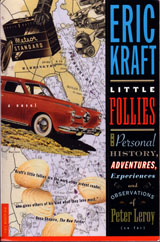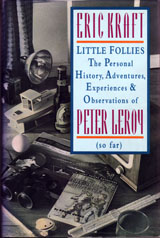

| Little Follies
The Static of the Spheres Chapter 18: A Job Like This |
by Eric
Kraft, as Peter
Leroy
|

YOU CAN READ THE FIRST HALF
YOU CAN ORDER THE
|
“There!” said Guppa at last. He turned toward me, raising the finished coil, the final coil, in a shaking hand. He had aged a great deal during the time that he had been at work on the radio. His eyes were red and teary, and the skin below them hung in dark, flaccid folds. His lips trembled and twitched with the effort to form a grandfatherly smile. “That’s great, Guppa!” I cried, with deep, genuine enthusiasm. The coil-winding was at last complete, the receiver was at last complete, a phase of my life had come to a crisp and clear conclusion. There was no ambiguity, no fuzzy line, no indeterminate point like that between breadness and toastness in Gumma’s toaster, no need for interpolation. This moment marked the end of the work on the radio, and anything to follow, whatever it might be, would be a post-radio-construction event. “This was the hardest one of all, wasn’t it?” I asked. I knew that it had been; I had been able to see that it had been, even though I avoided watching Guppa too carefully and hoped that he did not know that I knew how many times he had unwound the coil and begun winding it again when he lost count of the windings. “Well, yes, it was,” he acknowledged. I could see him gaining in strength now that the winding was done, now that everything was done. He was beginning to allow himself to feel proud. “A job like this has got to be done just right,” he said, raising the coil a little higher in a steadier hand. “If you’re not ready to do what has to be done the way it should be done, then you’re not ready to do it at all. Now, you take this coil. I could probably have been off by a few turns and it wouldn’t have made all that much difference, except to me. I’d know that it wasn’t right. That’s why I had to stick to it until it was right.” Now he was glowing. His hand was firm, and he drew in deep breaths of the damp cellar air. He could relax now. He and I would be able to straighten things up on the bench, put the few remaining leftover parts into the electrical gadget jar, go upstairs to the kitchen, smiling so that Gumma would say that we looked like the cat that swallowed the canary, tell her about the progress we had made, then surprise her with the finished radio, listen to a few foreign broadcasts, show the radio to my parents when they arrived, eat dinner, sit in the living room and listen for a while longer, and then go to bed, content. I heard the door at the top of the stairs open, and I heard rapid, brisk footsteps coming down the stairs. Mr. Beaker popped around the corner. “What industry!” he cried. “You two haven’t seen the light of day since breakfast, I understand.” He leaned back in an exaggerated pose and scrutinized us with exaggerated care. “Hmmmm,” he said. “From the fact that you got up so early, Herb, and from the little grins that you two are wearing, I’d say that you’re getting very close to the end of this project. How’s the work going?” With pride, I announced to him that Guppa had wound all the coils and we would be listening in on the babble of foreign tongues any minute now. “Take a look at this,” I said. I picked up the coil that Guppa had finished. “This was the toughest one of all. It has the finest wire and the most windings.” “That is quite a piece of work,” said Mr. Beaker. He took the coil from me and held it in front of him, raising it to eye level as if it were a jewel. “Quite a piece of work,” he repeated. He looked closely at the coil and said, “Mm-mm-mm.” He compressed his lips and nodded his approval. “How many windings does this have?” he asked Guppa. Guppa had been smiling, standing with his hands in his pockets and rocking on his heels. Mr. Beaker’s question had a visible effect on him, the same effect as a sudden increase in the mass of the earth would have had. All of Guppa seemed to slump. “How many windings?” Guppa asked. “Yes,” said Mr. Beaker. “How many windings?” My throat became dry, my palms moist. I knew that something was terribly wrong. I didn’t want to look at Guppa, but I couldn’t look away from him. He pulled his hands from his pockets and swept them through his hair, pushing it back from his forehead. “It’s got about—” He looked at me. I gave him a jaunty smile that I intended to mean “I have every confidence in you, Guppa. You’re my hero.” He squinted his eyes and peered at me as if he had forgotten who I was. “I don’t know,” he said. “It was in the hundreds—I know that.” He turned toward the plans, open on his workbench, then turned away quickly, as if looking at the plans would have been cheating. “I’m sure I got it right,” he said. He seemed to be pleading. “Me too!” I said, with great verve and the conviction that came from a heartfelt desire not to have him wind the coil again. “I’m sure that a few turns more or less won’t make enough difference for anyone to notice anyway,” said Mr. Beaker. He put the coil down on the bench. Guppa picked the coil up and peered at it, as if by looking closely enough he would have been able to remember exactly how many turns of that fine varnished wire he had made. He sighed. “We’ll try again tomorrow,” he said. “What do you say we quit for the day and get something to eat?” “Oh, yeah!” I cried. I dashed toward the stairs and pounded up them. I had to get away from Guppa. There was a lump in my throat, and I could feel the tears forming in my eyes. I felt horribly sorry for Guppa, who so wanted to please and impress me, and I felt sorry for myself, too, for I was now going to have to spend God knows how much longer sitting on the cold metal stool beside Guppa watching him rewind that damned coil. |

|
||

Here are a couple of swell ideas from Eric Kraft's vivacious publicist, Candi Lee Manning: Tip the author.
Add yourself to our e-mailing list.
|
Little Follies is a work of fiction. The characters, incidents, dialogues, settings, and businesses portrayed in it are products of the author’s imagination and are not to be construed as real. Any resemblance to actual events or persons, living or dead, is entirely coincidental. All rights reserved. No part of this book may be reproduced or transmitted in any form or by any means, electronic or mechanical, including photocopying, recording, or by any information storage and retrieval system, without permission in writing from the author. “My Mother Takes a Tumble,” “Do Clams Bite?,” “Life on the Bolotomy,” “The Static of the Spheres,” “The Fox and the Clam,” “The Girl with the White Fur Muff,” “Take the Long Way Home,” and “Call Me Larry” were originally published in paperback by Apple-Wood Books. Little Follies was first published in hardcover by Crown Publishers, Inc., 201 East 50th Street, New York, New York 10022. Member of the Crown Publishing Group. YOU CAN ORDER THE
For information about publication rights outside the U. S. A., audio rights, serial rights, screen rights, and so on, e-mail the author’s imaginary agent, Alec “Nick” Rafter. The illustration at the top of the page is an adaptation of an illustration by Stewart Rouse that first appeared on the cover of the August 1931 issue of Modern Mechanics and Inventions. The boy at the controls of the aerocycle doesn’t particularly resemble Peter Leroy—except, perhaps, for the smile. |
|
||||||
| . | . |